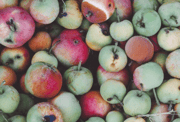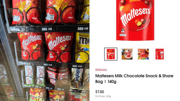What should you do with your soft plastics now that supermarkets are pausing their ‘recycling’?
- Replies 8
For many of us, the news that Australia's largest plastic bag recycling program, REDcycle, has paused its collection program comes as a huge blow.
Not only does it mean we have to find something else to do with our soft plastics, but it also makes us feel more guilty about using them in the first place.
It's a classic case of good intentions gone wrong. We were trying to do our bit for the environment by bringing our haul of used plastic bags to recycling collection points at major supermarkets. And now we feel like we've let the planet down.
But before you beat yourself up too much, know that you're not alone in this – and that there are bigger issues at play here than just your personal choices.
As it turns out, this whole debacle has exposed deeper problems within the packaging industry as a whole.
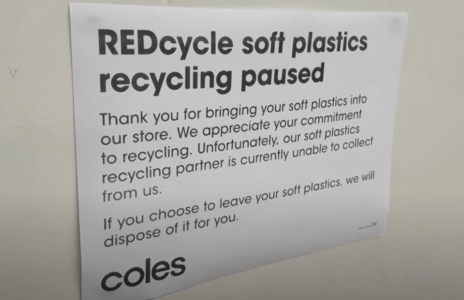
When REDcycle announced their decision to pause collections late on Tuesday night, it came after several online news outlets reported earlier that day that stockpiles of un-recycled soft plastics were accumulating under their scheme.
Apparently, even though Australians were dutifully bringing their used plastic bags to be recycled, they weren't being recycled… they were being stockpiled instead! Talk about a punch in the gut.
How long is the recycling program on hold for?
At this time, we don't have an official estimate for how long the pause will be, but we can say that everyone involved is working on the issue. The program will be back up and running ‘as soon as possible’, according to REDcycle and its shop partners.
In response to this news, peak industry bodies such as The Waste Management and Resource Recovery Association of Australia (WMRR) and The Australian Food and Grocery Council (AFGC), as well as not-for-profit operations such as Boomerang Alliance have all come forward urging for major change throughout the supply chain - right up to government level - to create a longer-term solution for recycling soft plastics on a larger scale than what currently exists.
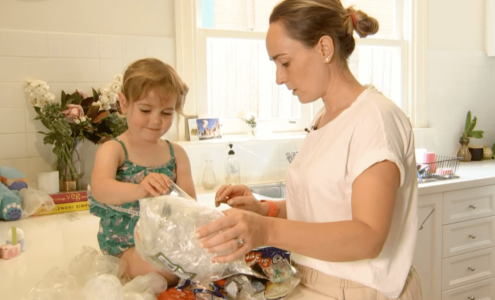
So what can you do in the meantime? Well, thankfully, there are still some options available. For starters:
You can try to reuse some soft plastics around the house in ways that are familiar to many of us, such as using plastic bags for bin liners, storage or even dog poo collection. (Although many soft plastics are difficult to reuse, so this might not be possible in all cases).
You should also keep in mind not to put soft, ‘scrunchable’ plastics in your kerbside recycling bin unless you are within one of the two local government areas in New South Wales where the Curby program is available.
The Curby program, which is only available in the Central Coast and Newcastle council areas at the moment, enables soft plastics to be recycled in the existing yellow bin within special bags.
The majority of councils in Australia can not accept soft plastic for recycling because it jams the automated sorting machines.
If all else fails, REDcycle has said that 'for the short term, consumers are encouraged to put their soft plastics in their home rubbish bin'.
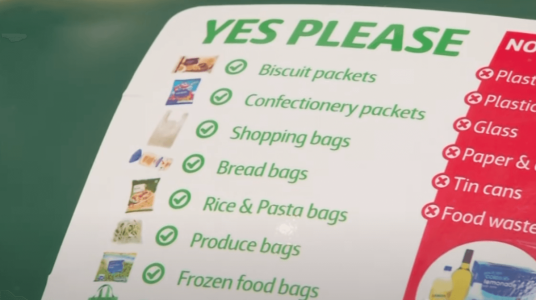
Aside from those options, the alternatives are pretty slim, unfortunately. However, there are some longer-term solutions currently in the works that may help to ease the burden on all of us in future. For instance:
The Australian Food and Grocery Council (AFGC) has said they are working with manufacturers to develop a national scheme for soft plastics recycling through kerbside collection of the material, with trials starting in a select few local government areas this week.
Jeff Angel, the director of Boomerang Alliance, has encouraged citizen action, saying that people should demand that the supermarkets put pressure on the supply chain to fix the problem.
'Supermarkets are very sensitive to consumer pressure,' he said.
'It's usually not the responsibility of the consumer because they didn't make the decision to put food products in plastic, but consumers can certainly put pressure on the producers to find alternative materials to plastic.'
Ryan Collins, the head of circular economy programs at Planet Ark, says there is currently no alternative to recycling soft plastics besides reducing the amount of plastic you use.
Here are some of their recommendations on what we can do in the meantime:

All in all, it's a frustrating situation. But at least there are some things we can do to try and ease the impact.
In the meantime, we here at SDC will continue to do our part in trying to bring awareness to this issue in the hope that real, lasting change will eventually come about. Fingers crossed!
What are your thoughts, members? How are you disposing and recycling your soft plastics at home? If you have more tips and advice to share with us, please feel free to share them in the comments!
Not only does it mean we have to find something else to do with our soft plastics, but it also makes us feel more guilty about using them in the first place.
It's a classic case of good intentions gone wrong. We were trying to do our bit for the environment by bringing our haul of used plastic bags to recycling collection points at major supermarkets. And now we feel like we've let the planet down.
But before you beat yourself up too much, know that you're not alone in this – and that there are bigger issues at play here than just your personal choices.
As it turns out, this whole debacle has exposed deeper problems within the packaging industry as a whole.

REDcycle announced their decision to pause collections after 'unforeseen challenges'. Credit: YouTube/7NEWS Australia.
When REDcycle announced their decision to pause collections late on Tuesday night, it came after several online news outlets reported earlier that day that stockpiles of un-recycled soft plastics were accumulating under their scheme.
Apparently, even though Australians were dutifully bringing their used plastic bags to be recycled, they weren't being recycled… they were being stockpiled instead! Talk about a punch in the gut.
How long is the recycling program on hold for?
At this time, we don't have an official estimate for how long the pause will be, but we can say that everyone involved is working on the issue. The program will be back up and running ‘as soon as possible’, according to REDcycle and its shop partners.
In response to this news, peak industry bodies such as The Waste Management and Resource Recovery Association of Australia (WMRR) and The Australian Food and Grocery Council (AFGC), as well as not-for-profit operations such as Boomerang Alliance have all come forward urging for major change throughout the supply chain - right up to government level - to create a longer-term solution for recycling soft plastics on a larger scale than what currently exists.

Soft plastics that you can't recycle at home should be put in a bag so they can be used again in the future. Credit: YouTube/ABC News (Australia).
So what can you do in the meantime? Well, thankfully, there are still some options available. For starters:
You can try to reuse some soft plastics around the house in ways that are familiar to many of us, such as using plastic bags for bin liners, storage or even dog poo collection. (Although many soft plastics are difficult to reuse, so this might not be possible in all cases).
You should also keep in mind not to put soft, ‘scrunchable’ plastics in your kerbside recycling bin unless you are within one of the two local government areas in New South Wales where the Curby program is available.
The Curby program, which is only available in the Central Coast and Newcastle council areas at the moment, enables soft plastics to be recycled in the existing yellow bin within special bags.
The majority of councils in Australia can not accept soft plastic for recycling because it jams the automated sorting machines.
If all else fails, REDcycle has said that 'for the short term, consumers are encouraged to put their soft plastics in their home rubbish bin'.

Soft plastic packaging can't be recycled through most kerbside recycling services. Credit: YouTube/Sky News Australia.
Aside from those options, the alternatives are pretty slim, unfortunately. However, there are some longer-term solutions currently in the works that may help to ease the burden on all of us in future. For instance:
The Australian Food and Grocery Council (AFGC) has said they are working with manufacturers to develop a national scheme for soft plastics recycling through kerbside collection of the material, with trials starting in a select few local government areas this week.
Jeff Angel, the director of Boomerang Alliance, has encouraged citizen action, saying that people should demand that the supermarkets put pressure on the supply chain to fix the problem.
'Supermarkets are very sensitive to consumer pressure,' he said.
'It's usually not the responsibility of the consumer because they didn't make the decision to put food products in plastic, but consumers can certainly put pressure on the producers to find alternative materials to plastic.'
Ryan Collins, the head of circular economy programs at Planet Ark, says there is currently no alternative to recycling soft plastics besides reducing the amount of plastic you use.
Here are some of their recommendations on what we can do in the meantime:
- Use reusable produce bags and take shopping bags to the supermarket as ways to help reduce the amount of extra soft plastic waste you create.
- Bulk-buying where possible, as multiple smaller packets create more plastic waste.
- Shop in places where you are able to bring your own containers or reusable bags, such as whole food stores or markets, as another way to reduce soft plastics.
- Avoid cling wrap where possible and use containers such as Tupperware instead.
Key Takeaways
- REDcycle has paused its collections from Woolworths and Coles, which is a blow to consumers who are trying to do the right thing for the environment.
- In the meantime, consumers are being encouraged to put their soft plastics in their home rubbish bins, rather than their recycling bins.
- There are some actions that consumers can take to reduce the amount of soft plastic waste they generate, such as using reusable produce bags and shopping in places where they are able to bring their own containers or reusable bags.
In the meantime, we here at SDC will continue to do our part in trying to bring awareness to this issue in the hope that real, lasting change will eventually come about. Fingers crossed!
What are your thoughts, members? How are you disposing and recycling your soft plastics at home? If you have more tips and advice to share with us, please feel free to share them in the comments!




